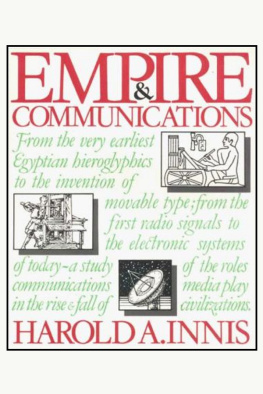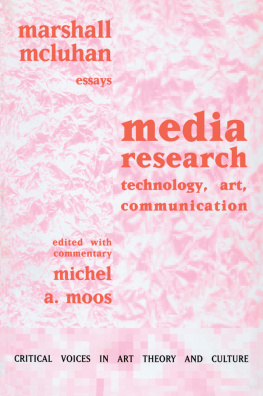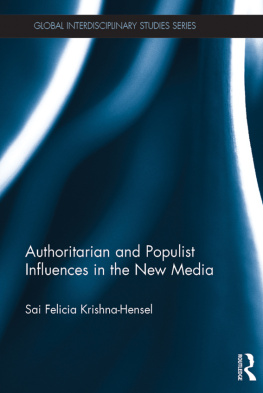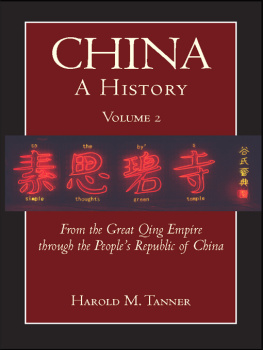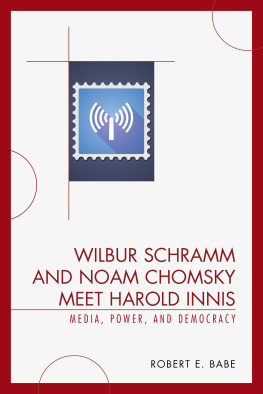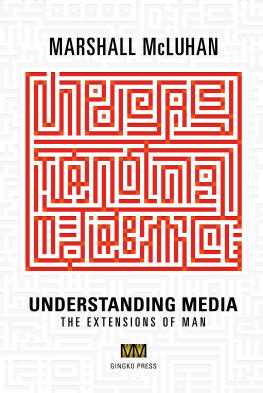I n this preface I must express my thanks to Sir Reginald Coupland for his kindness in extending to me an invitation to deliver the Beit lectures on Imperial economic history. I am grateful to him for his consistent encouragement. To his name I must add those of Professor W. K. Hancock, Sir Henry Clay, and Humphrey Sumner, Warden of All Souls College, for innumerable kindnesses. I have been greatly encouraged also by Professor and Mrs. John U. Nef and the Committee on Social Thought and Professor F. H. Knight of the University of Chicago. An interest in the general problem was stimulated by the late Professor C. N. Cochrane and the late Professor E. T. Owen. Professor Grant Robertson, Professor W. T. Easterbrook, Mr. R. H. Fleming, and Mr. D. Q. Innis have read the manuscript in whole or in part. I am under heavy obligations to Mr. W. S. Wallace and his staff in the library of the University of Toronto and to my colleagues in the department of political economy.
No one can be oblivious to the work of Kroeber, Mead, Marx, Mosca, Pareto, Sorokin, Spengler, Toynbee, Veblen, and others in suggesting the significance of communication to modern civilization. I have attempted to work out its implications in a more specific fashion and to suggest the background of their volumes. The twentieth century has been conspicuous for extended publications on civilization which in themselves reflect a type of civilization. It is suggested that all written works, including this one, have dangerous implications to the vitality of an oral tradition and to the health of a civilization, particularly if they thwart the interest of a people in culture and, following Aristotle, the cathartic effects of culture. It is written but I say unto you is a powerful directive to Western civilization.
H. A. I.
I
A. INTRODUCTION
T he twentieth century has been notable in the concern with studies of civilizations. Spengler, Toynbee, Kroeber, Sorokin, and others have produced works, designed to throw light on the causes of the rise and decline of civilizations, which have reflected an intense interest in the possible future of our own civilization. In the title of these lectures on imperial economic history it is clear that in our civilization we are concerned not only with civilizations but also with empires and that we have been seized with the role of economic considerations in the success or failure of empires. Recognition of the importance of economic considerations is perhaps characteristic of the British Empire and it will be part of our task to appraise their significance to the success or failure of the British Empire and in turn to the success or failure of Western civilization. We may concede with Mark Pattison that
.... In one department of progress the English development has indeed been complete, regular, and from within. In commerce and manufactures England may be said to have conducted, on behalf of the world, but at her own risks and perils, the one great commercial experiment that has yet been made. Our practice has been so extended and diversified, that from it alone, with but little reference to that of the other trading nations of antiquity, or of modern times, the laws of economics have been inferred, and a new science constructed on a solid and indisputable basis ....
We are immediately faced with the very great, perhaps insuperable, obstacle of attempting in this University, located so near a centre which has been the heart of an economic empire, to appraise economic considerations by the use of tools which are in themselves products of economic considerations. A citizen of one of the British Commonwealth of Nations which has been profoundly influenced by the economic development of empires, who has been obsessed over a long period with an interest in the character of that influence, can hardly claim powers of objectivity adequate to the task in hand. It is an advantage, however, to emphasize these dangers at the beginning so that we can at least be alert to the implications of the type of bias. Obsession with economic considerations illustrates the dangers of monopolies of knowledge and suggests the necessity of appraising its limitations. Civilizations can survive only through a concern with their limitations and in turn through a concern with the limitations of their institutions including empires.
We shall try to take heed of the warning of John Stuart Mill who
believed that, though the science's method of investigation was still applicable universally, it is, when not duly guarded against, an almost irresistible tendency of the human mind to become the slave of its own hypotheses; and when it has once habituated itself to reason, feel, and conceive, under certain arbitrary conditions, at length to mistake these convictions for laws of nature.
And we shall try to escape his strictures on English political economists whom he felt were in danger of becoming enemies of reform.
They revolve in their eternal circle of landlords, capitalists, and labourers, until they seem to think of the distinction of society into those three classes, as if it were one of God's ordinances, not man's, and as little under human control as the division of day and night. Scarcely any one of them seems to have proposed to himself as a subject of inquiry, what changes the relations of those classes to one another are likely to undergo in the progress of society; to what extent the distinction itself admits of being beneficially modified, and if it does not even, in a certain sense, tend gradually to disappear.
I shall perhaps find sympathy in these warnings in this University though it is perhaps easier for one trained in the universities of North America to be alert to them, but this is scarcely the time to appear boastful.
In paying heed to these warnings I do not intend to concentrate on microscopic studies of small periods or regions in the history of the British Empire, important as these are to its understanding. Nor shall I confine my interest to the British Empire as a unique phenomenon, since it is to an important extent a collection of odds and ends of other empires represented by the French in Quebec and the Dutch in South Africa. I shall attempt rather to focus attention on other empires in the history of the West, with reference to empires of the East, in order to isolate factors which seem important for purposes of comparison. Immediately one is daunted by the vastness of the subject and immediately it becomes evident that we must select factors which will appear significant to the problem.

